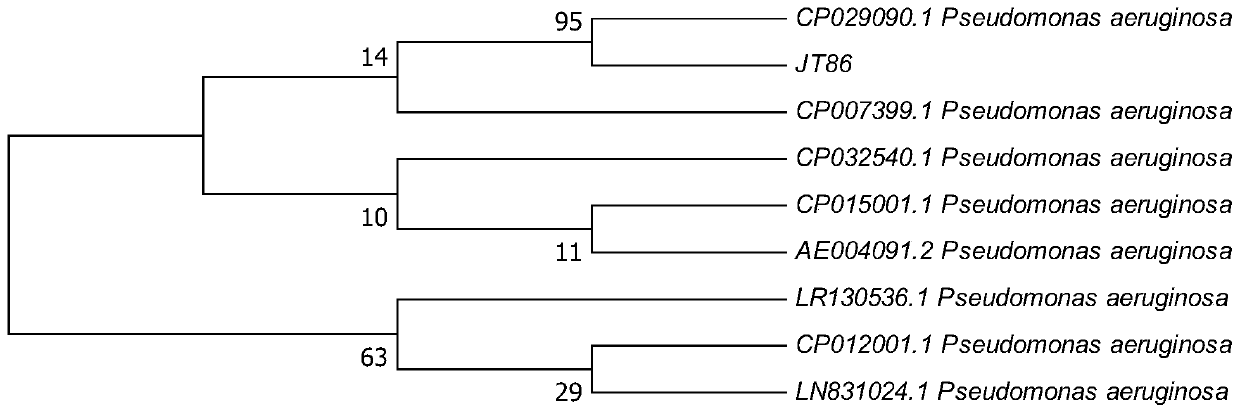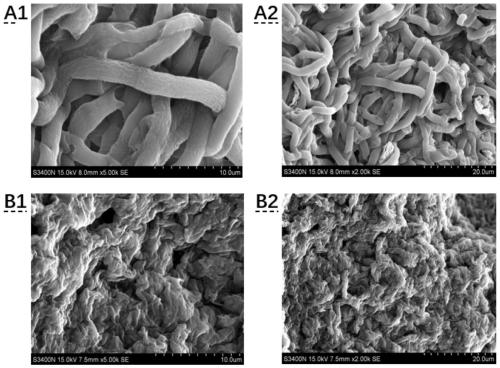Pseudomonas aeruginosa JT86 and application of pseudomonas aeruginosa JT86 in prevention and treatment of sclerotiniose
A Pseudomonas aeruginosa, JT86 technology, applied in the application, bacteria, fungicides and other directions, can solve problems such as disease control difficulties, natural environment damage, etc., to achieve extensive development and application prospects, reduce use, and reduce pesticide residues.
- Summary
- Abstract
- Description
- Claims
- Application Information
AI Technical Summary
Problems solved by technology
Method used
Image
Examples
Embodiment 1
[0038] Example 1 Isolation and screening of Pseudomonas aeruginosa (Pseudomonas aeruginosa) JT86
[0039]1. Sample collection:
[0040] Soil samples were collected from the paddy fields of Yuejin North Farm, South China Agricultural University, Tianhe District, Guangzhou City, Guangdong Province, and placed in sterile centrifuge tubes and brought back to the laboratory for strain isolation.
[0041] 2. Separation of biocontrol bacteria:
[0042] After mixing the soil sample evenly, take 5g of the soil sample and place it in a 50mL sterile centrifuge tube, add sterile water to 50mL, shake vigorously to suspend the soil sample, and mark it as 1×10 -1 . Then pipette 1 mL of 1×10 -1 the soil sample suspension into a new centrifuge tube filled with 9mL sterile water, and successively diluted to 1×10 -2 , 1×10 -3 series concentration soil solution. Draw 0.1mL of 1×10 -2 , 1×10 -3 Put the soil solution on a solid LB plate (yeast extract 5g, tryptone 10g, NaCl 5g, water 1000mL...
Embodiment 2
[0050] Example 2 Identification of Pseudomonas aeruginosa (Pseudomonas aeruginosa) JT86
[0051] 1. Morphological identification
[0052] (1) Experimental method
[0053] The JT86 strain screened in Example 1 was cultured on LB medium, the morphological characteristics were observed, and physiological and biochemical identification was carried out.
[0054] (2) Experimental results
[0055] The morphological characteristics of JT86 strain are as follows: figure 1 As shown, it can be seen that the colony shape of the strain is round, light yellow, with smooth edges, raised center, smooth surface, dull, translucent, Gram staining negative, and the electron microscope shows that the bacteria are short oval Rod-shaped, single cell, cell size 1.8×3.0μm.
[0056] In addition, the physiological and biochemical identification results found that the physiological and biochemical tests of the JT86 strain were positive in contact enzyme reaction, oxidase reaction, motility measuremen...
Embodiment 3
[0067] Example 3 Inhibition experiment of Pseudomonas aeruginosa (Pseudomonas aeruginosa) JT86 on sclerotia germination
[0068] 1. Experimental method
[0069] Take the Pseudomonas aeruginosa JT86 stored in glycerol at -80°C, activate it on LB solid medium at 30°C for 48 hours, dip the single colony of the activated Pseudomonas aeruginosa JT86 into 100mL NA liquid medium, and set it at 28°C at 200rpm Shake the bacteria for 48 hours. Afterwards, according to the 10% inoculum size, the secondary culture was carried out, that is, 10% of the bacterial liquid was taken in 100 mL of NA liquid medium, and the bacterial culture was shaken at 200 rpm at 28° C. for 48 hours to obtain the fermentation broth of Pseudomonas aeruginosa JT86.
[0070] Pick 120 sclerotias of rice sheath blight bacteria, peanut white sclerotia and rape sclerotinia of the same size, set up the control group and treatment group for 3 repetitions, and carry out surface disinfection on the sclerotia, that is, us...
PUM
 Login to View More
Login to View More Abstract
Description
Claims
Application Information
 Login to View More
Login to View More - R&D
- Intellectual Property
- Life Sciences
- Materials
- Tech Scout
- Unparalleled Data Quality
- Higher Quality Content
- 60% Fewer Hallucinations
Browse by: Latest US Patents, China's latest patents, Technical Efficacy Thesaurus, Application Domain, Technology Topic, Popular Technical Reports.
© 2025 PatSnap. All rights reserved.Legal|Privacy policy|Modern Slavery Act Transparency Statement|Sitemap|About US| Contact US: help@patsnap.com



